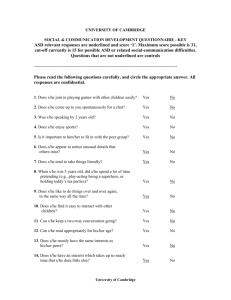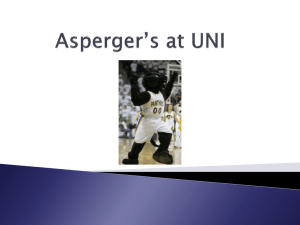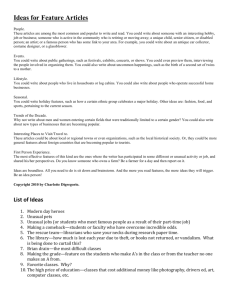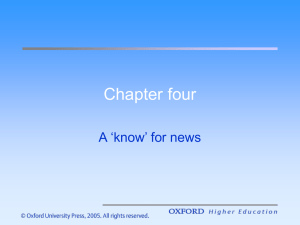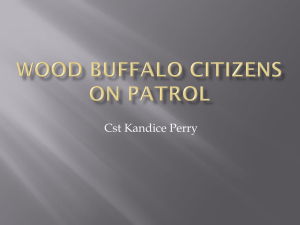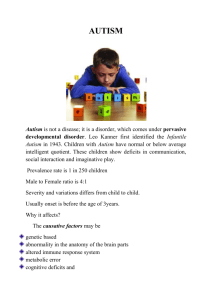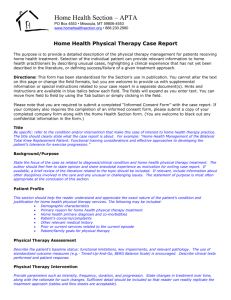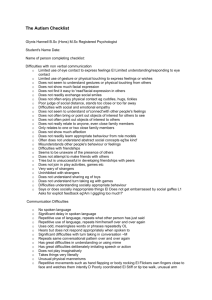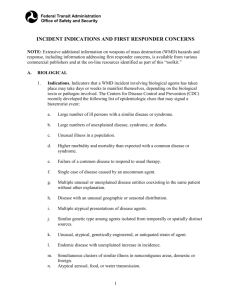Childhood Asperger Syndrome Test (CAST)
advertisement
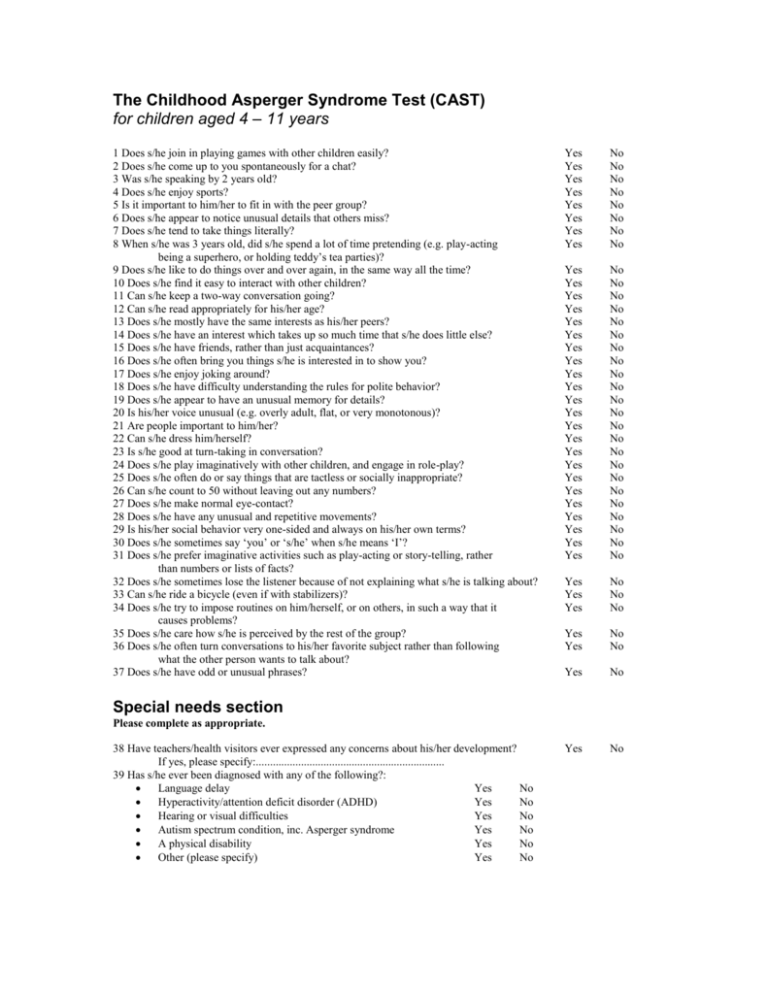
The Childhood Asperger Syndrome Test (CAST) for children aged 4 – 11 years 1 Does s/he join in playing games with other children easily? 2 Does s/he come up to you spontaneously for a chat? 3 Was s/he speaking by 2 years old? 4 Does s/he enjoy sports? 5 Is it important to him/her to fit in with the peer group? 6 Does s/he appear to notice unusual details that others miss? 7 Does s/he tend to take things literally? 8 When s/he was 3 years old, did s/he spend a lot of time pretending (e.g. play-acting being a superhero, or holding teddy’s tea parties)? 9 Does s/he like to do things over and over again, in the same way all the time? 10 Does s/he find it easy to interact with other children? 11 Can s/he keep a two-way conversation going? 12 Can s/he read appropriately for his/her age? 13 Does s/he mostly have the same interests as his/her peers? 14 Does s/he have an interest which takes up so much time that s/he does little else? 15 Does s/he have friends, rather than just acquaintances? 16 Does s/he often bring you things s/he is interested in to show you? 17 Does s/he enjoy joking around? 18 Does s/he have difficulty understanding the rules for polite behavior? 19 Does s/he appear to have an unusual memory for details? 20 Is his/her voice unusual (e.g. overly adult, flat, or very monotonous)? 21 Are people important to him/her? 22 Can s/he dress him/herself? 23 Is s/he good at turn-taking in conversation? 24 Does s/he play imaginatively with other children, and engage in role-play? 25 Does s/he often do or say things that are tactless or socially inappropriate? 26 Can s/he count to 50 without leaving out any numbers? 27 Does s/he make normal eye-contact? 28 Does s/he have any unusual and repetitive movements? 29 Is his/her social behavior very one-sided and always on his/her own terms? 30 Does s/he sometimes say ‘you’ or ‘s/he’ when s/he means ‘I’? 31 Does s/he prefer imaginative activities such as play-acting or story-telling, rather than numbers or lists of facts? 32 Does s/he sometimes lose the listener because of not explaining what s/he is talking about? 33 Can s/he ride a bicycle (even if with stabilizers)? 34 Does s/he try to impose routines on him/herself, or on others, in such a way that it causes problems? 35 Does s/he care how s/he is perceived by the rest of the group? 36 Does s/he often turn conversations to his/her favorite subject rather than following what the other person wants to talk about? 37 Does s/he have odd or unusual phrases? Yes Yes Yes Yes Yes Yes Yes Yes No No No No No No No No Yes Yes Yes Yes Yes Yes Yes Yes Yes Yes Yes Yes Yes Yes Yes Yes Yes Yes Yes Yes Yes Yes Yes No No No No No No No No No No No No No No No No No No No No No No No Yes Yes Yes No No No Yes Yes No No Yes No Yes No Special needs section Please complete as appropriate. 38 Have teachers/health visitors ever expressed any concerns about his/her development? If yes, please specify:................................................................... 39 Has s/he ever been diagnosed with any of the following?: Language delay Yes No Hyperactivity/attention deficit disorder (ADHD) Yes No Hearing or visual difficulties Yes No Autism spectrum condition, inc. Asperger syndrome Yes No A physical disability Yes No Other (please specify) Yes No SCORING: Give 1 point for each answer indicated below. Questions #28 and #39 are not included in this scoring. The CAST is not a diagnostic instrument, and no minimum threshold for an autism spectrum disorder has been determined. However, a score of 15 points or higher may warrant further investigation for an autism spectrum disorder. 1 Does s/he join in playing games with other children easily? 2 Does s/he come up to you spontaneously for a chat? 3 Was s/he speaking by 2 years old? 4 Does s/he enjoy sports? 5 Is it important to him/her to fit in with the peer group? 6 Does s/he appear to notice unusual details that others miss? 7 Does s/he tend to take things literally? 8 When s/he was 3 years old, did s/he spend a lot of time pretending (e.g. play-acting being a superhero, or holding teddy’s tea parties)? 9 Does s/he like to do things over and over again, in the same way all the time? 10 Does s/he find it easy to interact with other children? 11 Can s/he keep a two-way conversation going? 12 Can s/he read appropriately for his/her age? 13 Does s/he mostly have the same interests as his/her peers? 14 Does s/he have an interest which takes up so much time that s/he does little else? 15 Does s/he have friends, rather than just acquaintances? 16 Does s/he often bring you things s/he is interested in to show you? 17 Does s/he enjoy joking around? 18 Does s/he have difficulty understanding the rules for polite behavior? 19 Does s/he appear to have an unusual memory for details? 20 Is his/her voice unusual (e.g. overly adult, flat, or very monotonous)? 21 Are people important to him/her? 22 Can s/he dress him/herself? 23 Is s/he good at turn-taking in conversation? 24 Does s/he play imaginatively with other children, and engage in role-play? 25 Does s/he often do or say things that are tactless or socially inappropriate? 26 Can s/he count to 50 without leaving out any numbers? 27 Does s/he make normal eye-contact? 28 Does s/he have any unusual and repetitive movements? 29 Is his/her social behavior very one-sided and always on his/her own terms? 30 Does s/he sometimes say ‘you’ or ‘s/he’ when s/he means ‘I’? 31 Does s/he prefer imaginative activities such as play-acting or story-telling, rather than numbers or lists of facts? 32 Does s/he sometimes lose the listener because of not explaining what s/he is talking about? 33 Can s/he ride a bicycle (even if with stabilizers)? 34 Does s/he try to impose routines on him/herself, or on others, in such a way that it causes problems? 35 Does s/he care how s/he is perceived by the rest of the group? 36 Does s/he often turn conversations to his/her favorite subject rather than following what the other person wants to talk about? 37 Does s/he have odd or unusual phrases? No No No No No Yes Yes No Yes No No No No Yes No No No Yes Yes Yes No No No No Yes No No Yes Yes Yes No Yes No Yes No Yes Yes Source: Scott FJ, Baron-Cohen S, Bolton P, Brayne C. The CAST (Childhood Asperger Syndrome Test) Preliminary development of a UK screen for mainstream primary-school-age children. Autism. 2002;6(1) 9– 31.
